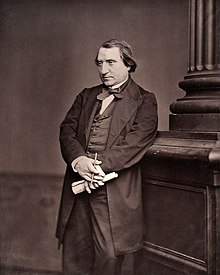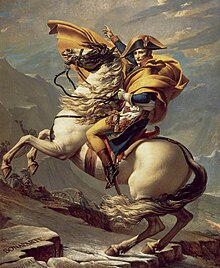Ernest Renan
Appearance

Ernest Renan (February 28, 1823 – October 12, 1892) was a French philosopher, playwright, historian, and writer.
Quotes
[edit]- To be free in an age like ours, one must be in a position of authority. That in itself would be enough to make me ambitious.
- Letter to his elder sister Henriette (1841).
- As a rule, all heroism is due to a lack of reflection, and thus it is necessary to maintain a mass of imbeciles. If they once understand themselves the ruling men will be lost.
- Orlando, in Caliban, act 2, sc. 1 (1878).
- He whom God has touched will always be a being apart: he is, whatever he may do, a stranger among men; he is marked by a sign.
- Oeuvres Complètes, vol. 3. L’Avenir de la Science (1890).
- A Muslim who knows French will never be a dangerous Muslim.
- quoted in Arvidsson, Stefan (2006), Aryan Idols: Indo-European Mythology as Ideology and Science, translated by Sonia Wichmann, Chicago and London: The University of Chicago Press.'(107)
- The Semites did not understand the variety, the plurality, the genders in God: the word goddess in Hebrew is the most horrible barbarism.
- quoted in Arvidsson, Stefan (2006), Aryan Idols: Indo-European Mythology as Ideology and Science, translated by Sonia Wichmann, Chicago and London: The University of Chicago Press.88
- The true Semitic society is that of the tent and of the tribe.
- quoted in Arvidsson, Stefan (2006), Aryan Idols: Indo-European Mythology as Ideology and Science, translated by Sonia Wichmann, Chicago and London: The University of Chicago Press."(96) **Renan
- Nature, on the other hand, plays a very small role in the Semitic religions: the desert is monotheistic; sublime in its immense uniformity, it primarily revealed to man the idea of 'infinite.'
- quoted in Arvidsson, Stefan (2006), Aryan Idols: Indo-European Mythology as Ideology and Science, translated by Sonia Wichmann, Chicago and London: The University of Chicago Press."9
- Thus, the Semitic race is recognizable almost solely through negative characteristics: it has neither mythology, nor epic, nor science, nor philosophy, nor fiction, nor plastic arts, nor civil life; in sum an absence of complexity, of nuance, an exclusive sentiment of unity.
- quoted in Arvidsson, Stefan (2006), Aryan Idols: Indo-European Mythology as Ideology and Science, translated by Sonia Wichmann, Chicago and London: The University of Chicago Press.96
- No place in the world has had a comparable role to that of the nameless mountain or valley where mankind first attained self-consciousness. Let us be proud ... of the old patriarchs who, at the foot of Imaiis, laid the foundations of what we are and of what we shall become.
- Poliakov, L. (1974). The Aryan myth : a history of racist and nationalist ideas in Europe page 208
Vie de Jésus (The Life of Jesus) (1863)
[edit]- In morals, truth is but little prized when it is a mere sentiment, and only attains its full value when realized in the world as fact.
- Ch. 5.
- Never has any one been less a priest than Jesus, never a greater enemy of forms, which stifle religion under the pretext of protecting it. By this we are all his disciples and his successors; by this he has laid the eternal foundation-stone of true religion; and if religion is essential to humanity, he has by this deserved the Divine rank the world has accorded him.
- Ch. 5.
- To conceive the good, in fact, is not sufficient; it must be made to succeed among men. To accomplish this less pure paths must be followed.
- Ch. 5.
- Jesus, in some respects, was an anarchist, for he had no idea of civil government. That government seems to him purely and simply an abuse.
- Ch. 7.
- Let us pardon him his hope of a vain apocalypse, and of a second coming in great triumph upon the clouds of heaven. Perhaps these were the errors of others rather than his own; and if it be true that he himself shared the general illusion, what matters it, since his dream rendered him strong against death, and sustained him in a struggle to which he might otherwise have been unequal?
- Ch. 17.
The Intellectual and Moral Reform of France (1871)
[edit]
- La réforme intellectuelle et morale de la France (1871), in La réforme intellectuelle et morale, 2nd edition (1872)
- La colonisation en grand est une nécessité politique tout à fait de premier ordre. Une nation qui ne colonise pas est irrévocablement vouée au socialisme, à la guerre du riche et du pauvre. La conquête d'un pays de race inférieure par une race supérieure, qui s'y établit pour le gouverner, n'a rien de choquant.
- Colonization on a grand scale is a political necessity of absolutely the first order. A nation that does not colonize is irrevocably vowed to socialism, to war between rich and poor. The conquest of a nation of inferior race by a superior race, which establishes itself as the ruler, has nothing shocking about it.
- 92-93
- Colonization on a grand scale is a political necessity of absolutely the first order. A nation that does not colonize is irrevocably vowed to socialism, to war between rich and poor. The conquest of a nation of inferior race by a superior race, which establishes itself as the ruler, has nothing shocking about it.
- We aspire not to equality but to domination. Countries inhabited by foreign races must become again countries of serfs, farm laborers, and factory workers. The goal is not to suppress inequities, but, rather, to amplify them and to make of them a matter of course.
- as translated by Asselin Charles, in "Colonial Discourse Since Christopher Columbus," Journal of Black Studies, Vol. 26, No. 2 (November 1995), p. 147
- La régénération des races inférieures ou abâtardies par les races supérieures est dans l'ordre providentiel de l'humanité. L'homme du peuple est presque toujours chez nous un noble déclassé ; sa lourde main est bien mieux faite pour manier l'épée que l'outil servile. Plutôt que de travailler, il choisit de se battre, c'est- à-dire qu'il revient à son premier état. .
- The regeneration of the inferior or bastard races by the superior ones is consistent with God's plans for humanity. The man of the people, in our countries, is always a fallen aristocrat; his hands are made to handle the sword rather than the laborer's tools. He prefers warring to working, that is, he returns to his original calling.
- 93, as translated by Asselin Charles, in "Colonial Discourse Since Christopher Columbus," Journal of Black Studies, Vol. 26, No. 2 (November 1995), 147
- The regeneration of the inferior or bastard races by the superior ones is consistent with God's plans for humanity. The man of the people, in our countries, is always a fallen aristocrat; his hands are made to handle the sword rather than the laborer's tools. He prefers warring to working, that is, he returns to his original calling.
- Regere imperio populos, voilà notre vocation.
- To rule the imperial population, behold our vocation.
- 94
- To rule the imperial population, behold our vocation.
- La nature a fait une race d'ouvriers ; c'est la race chinoise, d'une dextérité de main merveilleuse sans presque aucun sentiment d'honneur; gouvernez-la avec justice , en prélevant d'elle pour le bienfait d'un tel gouvernement un ample douaire au profit de la race conquérante, elle sera satisfaite ; une race de travailleurs de la terre, c'est le nègre ; soyez pour lui bon et humain, et tout sera dans l'ordre; -- une race de maîtres et de soldats, c'est la race européenne .
- Nature has made a race of workers; that is the Chinese race, with a marvelous dexterity of hand and hardly any feeling of honor; govern this race with justice by exacting from them through the competence of such government an ample dowry to the conquering race; the subordinate race will be satisfied; a race of workers of the earth, such is the Negro; let us be for him good and human, and everything will be in order -- a race of masters and soldiers, that is the European race.
- 94
- Nature has made a race of workers; that is the Chinese race, with a marvelous dexterity of hand and hardly any feeling of honor; govern this race with justice by exacting from them through the competence of such government an ample dowry to the conquering race; the subordinate race will be satisfied; a race of workers of the earth, such is the Negro; let us be for him good and human, and everything will be in order -- a race of masters and soldiers, that is the European race.
Ernest Renan: a Critical Biography (1964)
[edit]By H. W. Wardman, University of London, Athlone Press, 1964
- I can die when I wish to: that is my elixir of life.
- The Republic.
- You may take great comfort from the fact that suffering inwardly for the sake of truth proves abundantly that one loves it and marks one out as being of the elect.
- Saint Sulpice and the Hidden God.
Attributed
[edit]- Getting its history wrong is part of being a nation
- translated by Eric Hobsbawm on p. 12 of Nations and Nationalism Since 1780: Programme, Myth, Reality (Cambridge University Press, 1992) from French original ("L'oubli et je dirai même l'erreur historique, sont un facteur essentiel de la formation d'une nation et c'est ainsi que le progrès des études historiques est souvent pour la nationalité un danger"), page 7-8 of Qu’est-ce qu’une nation ?
Quotes about Ernest Renan
[edit]- A famous student of history has bequeathed to us a definition of nationality which is worth attention: I refer to Ernest Renan, of whom George Meredith once said to me, while the great French critic was still living, that there was more in his head than in any other head in Europe. Renan tells us that "Man is enslaved neither by his race, nor by his language, nor by his religion, nor by the course of rivers, nor by the direction of mountain ranges. A great aggregation of men, sane of mind and warm of heart, creates a moral consciousness which is called a nation."
- Lord Haldane, Higher Nationality: A Study in Law and Ethics: An Address Delivered Before the American Bar Association at Montreal on 1st September 1913 (1913), p. 35
- There has always been an element of the magical in the style of M. Ernest Renan—an art of saying things in a way to make them beautiful.
- Henry James, Atlantic Monthly (August 1883)



